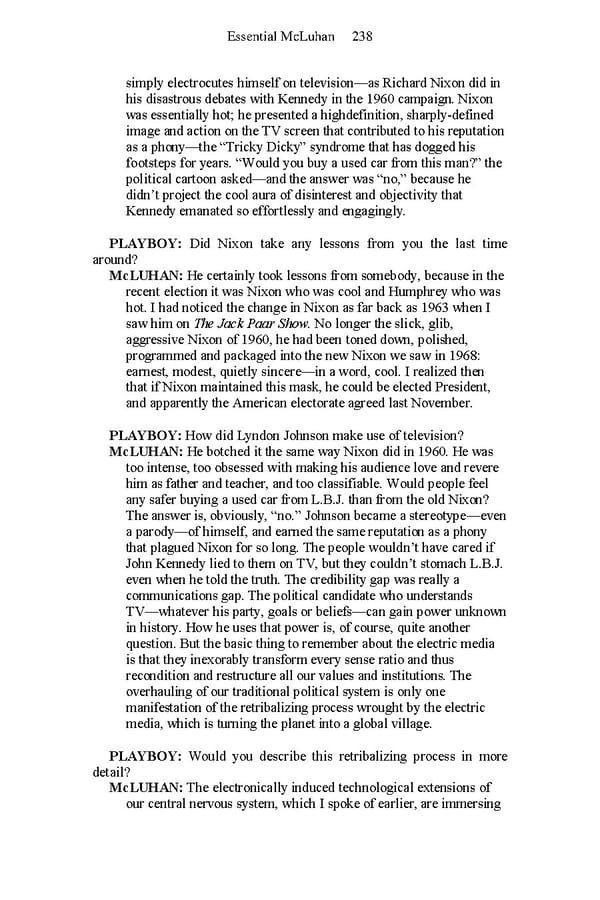Essential McLuhan 238 simply electrocutes himself on television—as Richard Nixon did in his disastrous debates with Kennedy in the 1960 campaign. Nixon was essentially hot; he presented a highdefinition, sharply-defined image and action on the TV screen that contributed to his reputation as a phony—the “Tricky Dicky” syndrome that has dogged his footsteps for years. “Would you buy a used car from this man?” the political cartoon asked—and the answer was “no,” because he didn’t project the cool aura of disinterest and objectivity that Kennedy emanated so effortlessly and engagingly. PLAYBOY: Did Nixon take any lessons from you the last time around? McLUHAN: He certainly took lessons from somebody, because in the recent election it was Nixon who was cool and Humphrey who was hot. I had noticed the change in Nixon as far back as 1963 when I saw him on The Jack Paar Show. No longer the slick, glib, aggressive Nixon of 1960, he had been toned down, polished, programmed and packaged into the new Nixon we saw in 1968: earnest, modest, quietly sincere—in a word, cool. I realized then that if Nixon maintained this mask, he could be elected President, and apparently the American electorate agreed last November. PLAYBOY: How did Lyndon Johnson make use of television? McLUHAN: He botched it the same way Nixon did in 1960. He was too intense, too obsessed with making his audience love and revere him as father and teacher, and too classifiable. Would people feel any safer buying a used car from L.B.J. than from the old Nixon? The answer is, obviously, “no.” Johnson became a stereotype—even a parody—of himself, and earned the same reputation as a phony that plagued Nixon for so long. The people wouldn’t have cared if John Kennedy lied to them on TV, but they couldn’t stomach L.B.J. even when he told the truth. The credibility gap was really a communications gap. The political candidate who understands TV—whatever his party, goals or beliefs—can gain power unknown in history. How he uses that power is, of course, quite another question. But the basic thing to remember about the electric media is that they inexorably transform every sense ratio and thus recondition and restructure all our values and institutions. The overhauling of our traditional political system is only one manifestation of the retribalizing process wrought by the electric media, which is turning the planet into a global village. PLAYBOY: Would you describe this retribalizing process in more detail? McLUHAN: The electronically induced technological extensions of our central nervous system, which I spoke of earlier, are immersing
 Essential McLuhan Page 244 Page 246
Essential McLuhan Page 244 Page 246